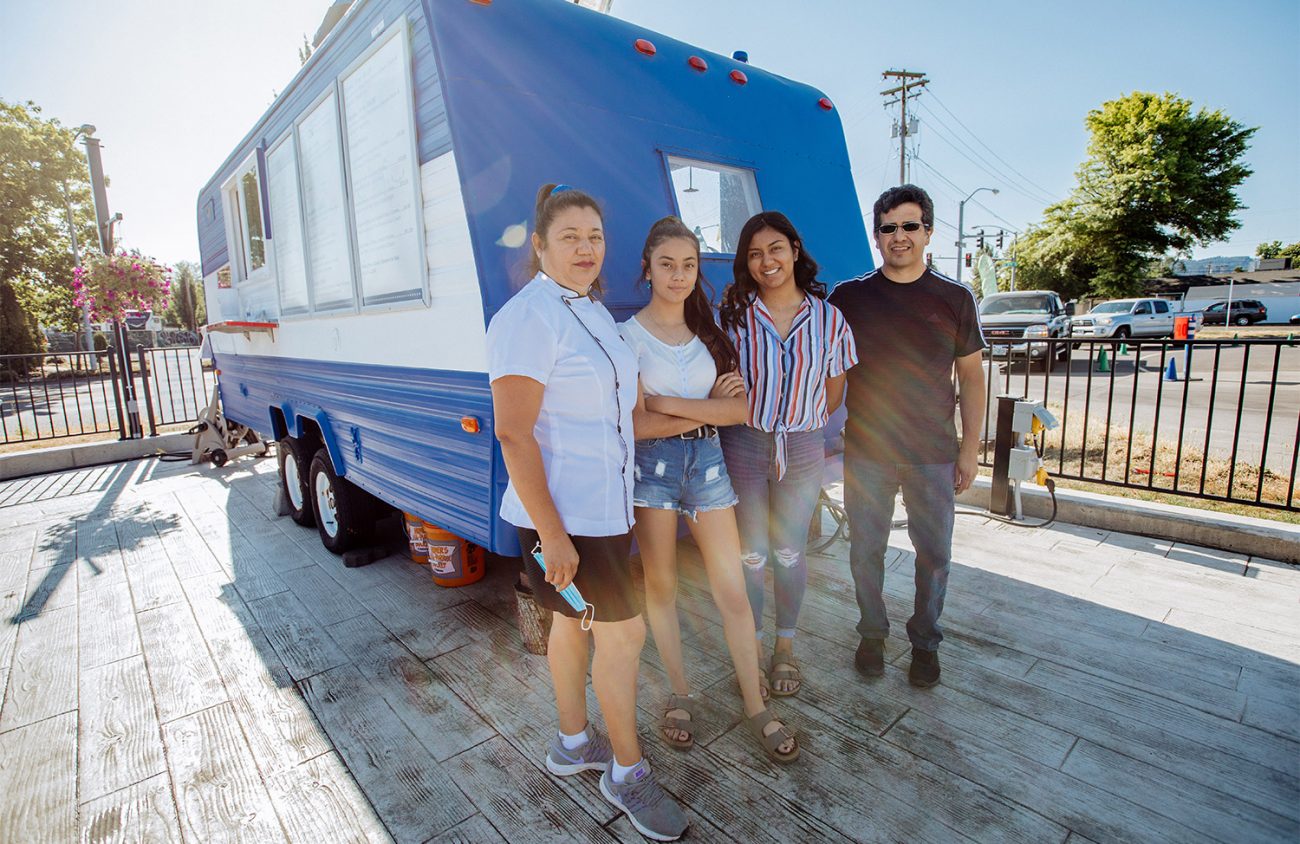Some of Eugene’s best pupusas, tacos and burritos, come out of a sea-blue trailer in the parking lot of an auto shop near 7th and Chambers. Denise Delgado’s Pupuseria Las Comadres is the fruit of a 30-year family history of immigration from San Salvador to Los Angeles to Eugene.
Las Comadres is a new name and a new business. But Delgado’s mother, Juanita Cortez, ran Juanita’s Pupuseria on 1st and Jefferson for 16 years.
Three months ago, Cortez was getting ready to move her food truck to 7th and Chambers, when she got in a terrible car crash. She fell into a coma and spent 19 days in the hospital before getting out, Delgado says. At that point, she wasn’t feeling fit to work.
“Ya no puedo trabajar en la troca, así que trabaja tú [I can’t work in the truck anymore, so you have to work now],” Cortez told Delgado.
Delgado had been working as a cashier at Goodwill for 10 years at that point and was reluctant to switch to the food business, but she decided to do it to fulfill her mother’s dream of building the new location.
Delgado painted the truck the sea-blue color, changed the name to “Pupuseria Las Comadres,” which means female friends, godmothers and midwives, among other things.
Pupusas are the focus of the food truck, and they’re advertised on a flag that billows as traffic passes by on Chambers. Pupusas are thick griddle cakes made of masa or rice flour and stuffed with cheese, meat and vegetables. They’re officially the national food of El Salvador, and Nov. 10 is national pupusa day.
In El Salvador, Delgado says, pupusas are eaten for breakfast, lunch, dinner and as a snack anytime in between. They’re found on every street corner, as ubiquitous as taco stands are in Mexico. And like tacos, pupusas are meant to be eaten on the street.
“It’s part of our culture, part of our gastronomy,” Delgado says in Spanish. “It’s beautiful to bring a part of our country to the United States.”
But bringing that culture, those pupusas, to America wasn’t an easy journey for Delgado and her mother.
They fled El Salvador in 1987 while the country was being torn apart by a violent civil war that took at least 75,000 lives.
“It was terrible living in that inferno,” Delgado says. “It was hard to leave our El Salvador, the cradle in which I was born, but we had to.”
From there, they moved to Los Angeles. But what Delgado found there was just more danger, more violence.
During the Salvadoran civil war, 500,000 to 1 million Salvadorans immigrated to the U.S., many to Los Angeles. Some of them formed La Mara Salvatrucha, or MS-13, a criminal organization known for its violence and its hatred of Mara 18, or the 18th Street gang, another Central American gang in Los Angeles.
By the mid-‘90s, La Mara Salvatrucha and Mara 18 were having a full-blown war on the streets of Los Angeles, where Delgado and Cortez lived.
Delgado was a young mother then. Her neighborhood in Los Angeles was no place to raise a child.
“In that time in Los Angeles, things were really bad,” Delgado says. “There were lots of mareros, lots of gangs.” Mareros are members of Mara gangs like MS-13 and the 18th Street gang.
Her mother, Cortez, moved to Eugene in 1997, following a friend. Delgado visited and liked what she saw: no civil wars, no gang members, no mareros. She moved to Eugene the next year.
“I came here for my children,” Delgado says. One of her daughters is now studying nursing at Linfield University in McMinnville.
At the food truck, business is starting to pick up after a slow start where she only made $40 per day at the beginning of the COVID-19 pandemic in Oregon. Delgado says when anybody, no matter where they’re from, tries her pupusas, they come back.
The pupusas, which cost $3, are the most popular item. For carnivores, she recommends the chicharrón revuelta con queso (ground pork and vegetables with cheese,) the carne asada (marinated steak) or adobada (marinated pork) pupusas.
For vegetarians, she serves cheese and zucchini, cheese and jalapeño and cheese and loroco pupusas. Loroco is a vine with an edible flower that’s been part of Central American cuisines since pre-colonial times.
All pupusas are served with a choice of traditional garlic-tomato salsa, or spicy red or green salsa and curtido, lightly pickled cabbage slaw with oregano.
Delgado’s husband is from Mexico City, Mexico, so she serves Mexican antojitos, or snacks, too, like tacos, burritos, tortas, soups and quesadillas.
If the pupusas keep selling, Delgado says she plans on buying a house for the family, because she’s renting an apartment now. In the future, she says she would consider moving the business to a brick-and-mortar restaurant.
While pupusas are everywhere in El Salvador, Delgado says they’re part of the multicultural food landscape of America, too.
“It’s American food,” she says. “We’re a country of immigrants.”
Pupuseria Las Comadres is at 760 Chambers Street. It’s open 10 am to 6 pm Monday through Friday and 10 am to 4 pm Saturday. Its phone number is (541) 514-3896
This article has been updated
